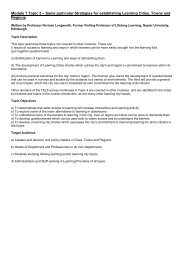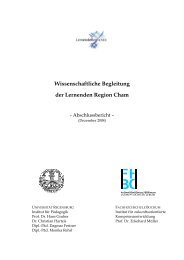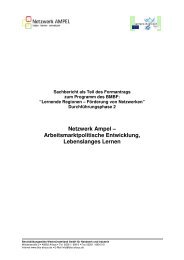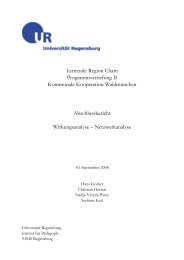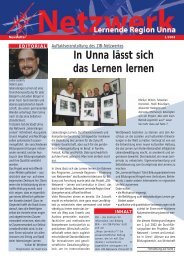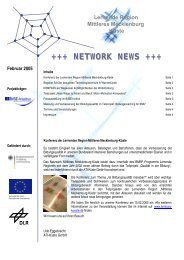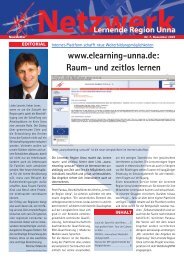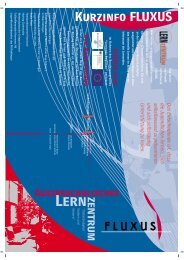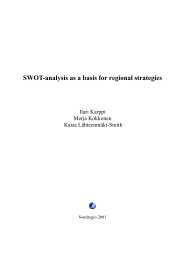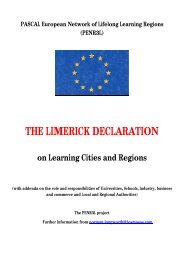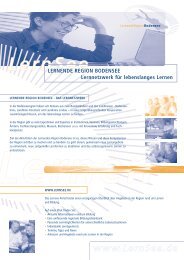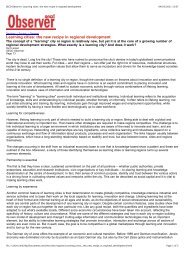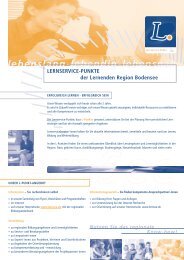Die Strategie für das Lebenslange Lernen ... - EUROlocal
Die Strategie für das Lebenslange Lernen ... - EUROlocal
Die Strategie für das Lebenslange Lernen ... - EUROlocal
Sie wollen auch ein ePaper? Erhöhen Sie die Reichweite Ihrer Titel.
YUMPU macht aus Druck-PDFs automatisch weboptimierte ePaper, die Google liebt.
214 R3L-INITIATIVE<br />
University of Stirling (coordinator)<br />
INDICATORS<br />
I. Problem area<br />
The overall aim of the Indicators project was to engage five<br />
Lifelong Learning expertise centres in five countries in the<br />
joint design, development, field-testing and implementation<br />
of indicators for Lifelong Learning progress in their own<br />
regions. More specifically the project consisted inter alia of<br />
the following subsidiary objectives:<br />
• to greatly increase the awareness and understanding of<br />
Lifelong Learning in municipalities and regions with the<br />
aim of transforming them into ‘Learning Cities, Towns<br />
and Regions’.<br />
• to sensitise leaders within the stakeholder sectors and<br />
city/regional administrations to the implications of implementing<br />
Lifelong Learning concepts.<br />
• to provide audit tools usable by many organisations in<br />
regions to enable them to become learning organisations<br />
contributing to the region’s Lifelong Learning develop -<br />
ment and growth.<br />
II. Solutions<br />
Two versions of each of five stakeholder audits for schools,<br />
universities, small companies, adult education colleges and<br />
for local and regional authority administrations have been<br />
developed:<br />
• a short version to give a general impression of the impact<br />
of lifelong learning on the organisation and to highlight<br />
the need for change.<br />
• a full and comprehensive version to assist organisations to<br />
develop new policies and strategies based on a detailed<br />
baseline understanding, and to implement changes over<br />
a period of time, which could in some instances involve years.<br />
The primary purpose of the field trials was to evaluate<br />
whether or not the stakeholder audits satisfied the objectives<br />
of giving information and provoking reflection leading<br />
to an awareness for new or modified strategies.<br />
Results from piloting of audits revealed a strong sense of<br />
commitment to concepts such as social inclusion and social<br />
justice. Later versions of the audit tool have been consider<br />
ably revised to ensure that all the language used reflects current<br />
and future standards in this area.<br />
III. Perspectives<br />
The tool itself is a continuously evolving creature and will<br />
respond to issues as they arise from further testing.<br />
The concept of the learning region maps well on to the<br />
activities of local and regional authorities, and it might be<br />
that future work in this area should use the natural boundaries<br />
of these organisations more explicitly to avoid confusion,<br />
as might occur in attempting to define the region of<br />
(e.g.) a University. Conversely, as several respondents pointed<br />
out, the concept of partnership often requires crossboundary<br />
working, and it is therefore important to avoid<br />
making ‘Local Authority’ and ‘learning region’ synonymous.<br />
Finally, the responses to the pilot project indicate that<br />
on-going co-operation with Local Authorities and other<br />
stakeholders is itself the essence of what the learning region<br />
is about. More research and co-operation is needed on the<br />
use of Audit tools, but we are satisfied that, this project has<br />
made a significant advance towards our understanding of<br />
what a learning region is and the consultation processes<br />
that must underpin it.<br />
The project benefited greatly through the establishment<br />
of co-operation between a number of stakeholders and<br />
regions across Europe. A key factor in the sustainability and<br />
extension of the network will be the establishment of a permanent<br />
infrastructure. The Observatory PASCAL may provide<br />
the locus for this.<br />
Partners<br />
• United Kingdom, Stirling, University of Stirling (lead<br />
agency)<br />
• France, Toulouse, Ecole Supérieure Commercial<br />
• Ireland, Limerick, University of Limerick,<br />
• Italy, Catania, Universita degli Studi di Catania<br />
• Norway, Akershus, Hogskolen Akershus<br />
www.obs-pascal.com



